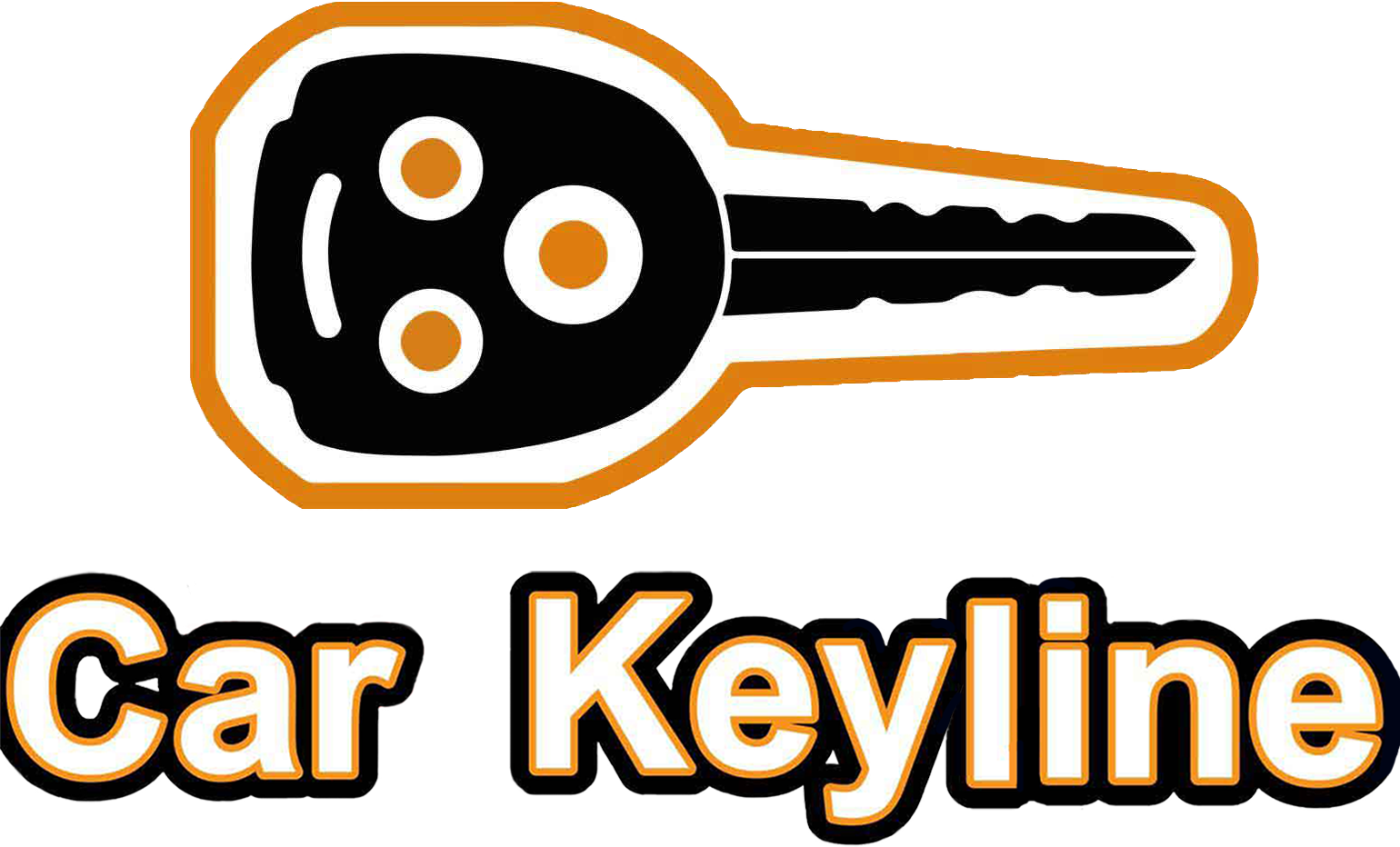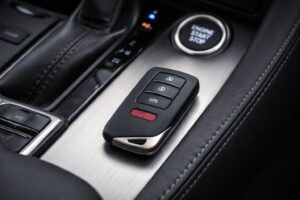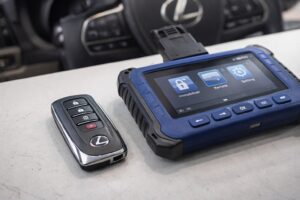Losing trust in your car keys can be frustrating—especially when you notice a bent key that no longer slides smoothly into the ignition lock or, worse, a broken car key in your hand. Many drivers wonder: Can a locksmith actually fix this problem, or is key fob replacement the only option? In this guide, we’ll break down the difference between repairable damage and cases where a professional locksmith is your best bet for a safe, lasting solution.

Understanding Car Key Damage (Foundation of the Problem)
Your car keys may look sturdy, but they’re more fragile than you think. Everyday habits, environmental conditions, and even the way you use them can lead to a bent key, a cracked blade, or eventually a completely broken car key. Understanding the causes helps you spot issues early and avoid potential damage to your ignition lock or keyway.
Common Causes of Car Key Damage
- Material Weakness
Most keys are made from metal alloys that can only take so much pressure. Over time, they wear down. - Daily Stress
Turning your key several times a day puts strain on the blade, especially if the keyhole is dirty or stiff. - Improper Use
Using your car keys as makeshift tools to open packages or pry objects can bend the blade or damage the area where it is bent. - Extreme Temperatures
Heat can soften metals, while cold makes them brittle, increasing the risk of breakage. - Lock Wear and Tear
A worn ignition lock or keyway can cause friction that gradually bends or damages your key.
Bent vs. Broken Car Key — What’s the Difference?
Knowing whether you have a bent key or a broken one is the first step before deciding on repair. Both issues affect how your car keys interact with the keyhole and ignition lock, but the symptoms and solutions are very different. Understanding these differences helps you avoid further damage and find the right fix.
Bent Car Key
A bent key often still looks whole, but you’ll notice it doesn’t slide into the keyhole smoothly. It may feel tight or require excessive force, which risks damaging the ignition lock. Locksmiths can sometimes provide bent car key repair by carefully straightening the blade and restoring smooth operation.
- Signs of a Bent Key: Feels stiff in the lock, blade shows a visible curve, and is harder to turn.
- Risks: Using force can worsen the bend or harm the lock mechanism.
- Fix: A locksmith can often realign the blade or cut a fresh copy if needed.
Broken Car Key
A broken key usually means a clear crack, a split, or a piece snapping off completely. At this stage, broken key fix methods shift from repair to replacement. Locksmiths often create a new key from your code or spare keys, ensuring safe use without risking your lock system.
- Signs of a Broken Key: Cracks in the metal, missing chunks, or the key snapping inside the ignition lock.
- Risks: Trying to use it can leave fragments stuck in the lock.
- Fix: Replacement is the safest option, often combined with reprogramming for modern keys.
When Locksmiths Can Repair a Bent Key
A bent key doesn’t always mean you need a full replacement. If the blade isn’t cracked and only shows a light curve, an automotive locksmith may be able to carefully straighten the car key. With the right tools and techniques, it can often be restored to smooth operation.
Here are the conditions where a locksmith can provide bent car key repair:
- Light Bend Only
If the bend is minor and there are no visible cracks, the key may be safely adjusted. - No Structural Damage
Locksmiths will check that the blade isn’t weakened or split before attempting any repair. - Use of Proper Tools
A professional may apply spray lubricant or a few drops of graphite powder to reduce friction during adjustment. - Testing in the Keyway
The repaired key is always tested in the keyway to ensure it works without resistance. - Safe Straightening Process
Rather than forcing the bend, locksmiths apply controlled pressure to avoid further damage.

When Locksmiths Recommend Key Replacement
Sometimes a bent key crosses the line into a broken car key, and repair simply isn’t safe. If the metal is cracked, split, or if the transponder key or immobilizer chip is damaged, a locksmith will advise a new key. This ensures reliable performance and prevents damage to your ignition lock.
Here are the situations where a locksmith recommends key replacement:
- Visible Cracks or Splits
Any break in the metal structure weakens the key and makes it unsafe to use. - Snapped or Missing Pieces
If part of the key is gone, repair is not possible—only a replacement will work. - Transponder Damage
A broken chip or damaged electronics in transponder keys or fobs require full transponder key replacement. - Immobilizer Issues
If the car doesn’t recognize the key due to a failed chip, car key cutting and programming a new key is necessary. - Risk of Lock Damage
Using a cracked key in the ignition lock could cause it to jam, leading to bigger, costlier problems.
Types of Car Keys and Repair Options
Not all car keys are built the same, which means repair options differ depending on the design. From traditional mechanical blades to advanced keyless start systems, each type has unique features—and unique problems. A professional locksmith can explain whether repair, reprogramming, or full replacement is the safest route.
Standard Mechanical Keys
These are the simplest keys, usually made of metal with cut ridges that match your ignition lock. If you have a bent car key of this type, locksmiths may be able to straighten it or cut a duplicate. However, once a fracture appears, replacement is the only reliable solution for smooth operation.
Laser-Cut / High-Security Keys
Laser-cut keys are thicker and cut with advanced precision. They provide extra security but also less tolerance for error. A broken car key of this type often requires a locksmith to perform a laser cut car key repair or duplicate it on specialized machines. Repairing bends is rare, as the design leaves little room for adjustment.
Transponder Keys
These keys contain chips that communicate with the car’s immobilizer. If the blade bends, it might still work, but if the chip is damaged, you’ll need a fix for the transponder key or full programming of a new one. Locksmiths can often reprogram and cut a replacement, ensuring your vehicle starts without issue.
Remote-Head Keys
Remote-head keys combine a traditional blade with electronic controls. A bent blade can sometimes be straightened or duplicated, but if the electronics fail, you’ll need both mechanical cutting and remote programming. This makes professional service the best choice for keeping everything in smooth operation.
Keyless Fobs and Keyless Start Systems
For modern keyless start vehicles, damage is less about bending and more about electronics. Smart key replacement is the only fix when the circuit board or battery housing fails. Locksmiths can program new fobs to sync with your vehicle’s immobilizer, providing both convenience and security.
Professional Locksmith Methods
When you’re dealing with a bent car key or a broken car key, a professional locksmith has the right tools and training to handle the problem safely. Instead of forcing a damaged key into the ignition lock, locksmiths follow proven methods to restore smooth operation and keep your vehicle secure.
Here’s how automotive locksmith services typically solve key-related issues:
- Detailed Inspection
Every job starts with a close look at the bent part or blade damage, checking whether repair or replacement is safer. - Key Cutting & Decoding
Locksmiths can cut or decode a new key using advanced machines, ensuring accuracy for your keyway. - Immobilizer & Keyless Programming
For modern vehicles, they handle car key programming, syncing new or replacement keys with the vehicle’s security system. - Extraction of Stuck Keys
If a fragment breaks inside the ignition lock or keyway, locksmiths carefully remove it without harming the lock. - Final Testing for Smooth Operation
Once repaired or replaced, the repaired key is tested several times to guarantee easy turning and reliable function.
DIY Tips & Mistakes to Avoid
If you find yourself holding a bent car key, there are a few simple things you can do before calling a professional locksmith. But it’s just as important to know what not to try, since one wrong move could turn a repairable key into a costly key replacement.
Here’s a clear look at safe DIY tips versus common mistakes:
| DIY Tips (Safe to Try) | Mistakes to Avoid (Risky) |
| Use Spray Lubricant – Add a few drops of lubricant or graphite powder into the keyway for smoother turning. | Excessive Force – Forcing a bent key into the ignition lock can cause permanent damage. |
| Gentle Testing – Try the key in the lock carefully to check if it still allows smooth operation. | Repeated Bending – Bending the key back and forth weakens the metal until it snaps. |
| Keep It Clean – Wipe away dirt and debris to reduce friction inside the keyhole. | DIY Glue Fixes – Using glue on a broken key often leaves residue inside the lock. |
| Have a Spare Handy – Switch to your spare key until you get professional assistance. | Ignoring Cracks – Continuing to use a cracked key risks it breaking inside the lock. |
Costs, Time, and Proof of Service
When you hire a professional locksmith to handle a bent or broken car key, it’s helpful to know what to expect. Prices vary depending on whether the key can be straightened, needs cutting, or requires programming. You’ll also need to show proof of ownership before work begins—this protects both you and your vehicle.
Here’s what usually comes into play when it comes to service:
- Proof of Ownership
Locksmiths will ask for ID and vehicle documents before working on your car keys. This step builds trust and prevents misuse. - Cost Breakdown
Simple straightening may be cheaper, while key replacement or car key programming costs more. The price depends on the type of key and whether electronics are involved. - Time Required
A quick bend adjustment can take minutes, but a full replacement—especially for modern keys tied to an ignition lock—may take longer due to programming. - On-Site vs Shop Service
Mobile locksmiths can come to you, while some cases may require visiting a shop with advanced machines. Each has its own pricing structure. - Warranty and Aftercare
Many locksmiths provide short-term warranties. It’s a good idea to ask about coverage in case the new or repaired key shows issues.
Preventing Future Car Key Problems
A little proper care goes a long way in avoiding the stress of a bent car key or sudden breakage. By changing a few habits and doing some regular maintenance, you can keep your car keys working smoothly and avoid unnecessary trips to the locksmith.
Here are smart ways to prevent future bending and protect your keys:
- Don’t Use Keys as Tools
Avoid prying, opening boxes, or using your car key for anything other than unlocking or starting your vehicle. Misuse quickly weakens the blade. - Protect Against Extreme Temperatures
Heat can warp metal, and cold can make it brittle. Keeping keys out of extreme weather helps preserve their strength. - Keep Spare Keys
Having spare keys means you don’t overuse one key, and it’s a lifesaver if your main key gets damaged. - Lubricate the Keyway
A few drops of graphite powder now and then reduces friction and ensures the lock mechanism stays in smooth operation. - Use Water Resistant Storage
Store keyless fobs in water resistant pouches or cases to shield electronics from moisture and accidental damage.
FAQs
You might be tempted to fix a bent car key at home, but it’s risky. Applying excessive force can snap the blade or damage the keyhole. A locksmith has the right tools to straighten it carefully or cut a duplicate, saving you from turning it into a broken car key.
No, glue is not a good idea for broken car keys. Glue may hold the pieces together for a moment, but it usually breaks again and often leaves residue in the ignition lock. Instead of a quick fix, seek professional help. Most of the time, a proper key replacement is the safest and most reliable option.
If your key is stuck, don’t force it. Forcing a bent blade deeper into the ignition lock can cause lasting damage. Call for locksmith broken car key help—a professional can safely extract it, repair or replace the blade, and keep the lock working smoothly.
Yes. While you can’t rebend a fob, locksmiths can repair housings, replace batteries, or program a new unit. If the electronics fail, a key replacement or reprogrammed keyless start fob is the solution. Locksmiths handle these cases regularly and provide professional assistance.
The price depends on your car model and the programming needed. A transponder key requires both cutting and syncing with your car’s system. On average, it costs more than a basic blade but far less than a dealership price. For an accurate quote, ask a professional locksmith.
Final Word: Trust a Professional Locksmith
At the end of the day, knowing whether a locksmith can fix a bent car key or if you need a replacement comes down to the condition of your car keys. Minor bends may be corrected, but once cracks appear, a new key is the safest choice to ensure smooth operation.
Investing in spare keys and practicing proper care is always a good idea to prevent future bending. And when the unexpected happens, an automotive locksmith offers the skills, tools, and experience to provide a repaired key or full replacement. Trusting a professional locksmith guarantees lasting results and peace of mind.




